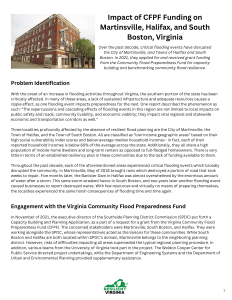
Virginia is experiencing an increase in critical flood events, broadly disrupting the public safety, roads, livability, and economic viability of many communities. A lack of sustainable infrastructure and adequate resources is causing a ripple effect, as one flooding event impacts a community’s ability to prepare for the next. The disruptions aren’t solely at the community level though. The consequences and cascading impacts of flooding events also impact vital regional and statewide economic and transportation corridors.
Three Virginia communities profoundly impacted by the absence of resilient flood planning are the City of Martinsville and the Towns of Halifax and South Boston. In 2021, the Southside Planning District (SPDC) put forth a Capacity Building and Planning Application with these communities as part of a grant request from the Virginia Community Flood Preparedness Fund (CFPF). With this funding, they have the overall goal of creating a roadmap which will identify critical areas they need to focus their efforts on. They will receive much-needed technical assistance to gain a better understanding of the flood risks they are facing, available resources, and where they have gaps in capacity. This report looks at the progress the communities have made in their analysis and how this is impacting their communities.




